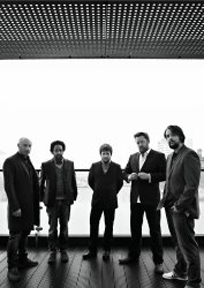Spotlight: Elbow

Remarkable things happen at an Elbow concert. Namely, fans who are normally too self-aware sing unabashedly, shout and pretty much do whatever charismatic lead singer Guy Garvey asks. (The group’s supporters will even belt out “Killing Me Softly” en masse, which happened at New York’s Webster Hall in 2008.)
Surely, the band stoked these fires by naming its second album Cast of Thousands – a nod to the massive Glastonbury sing-along captured on the record’s final track, “Grace Under Pressure.” But the Manchester, England rock quintet hasn’t been saddled with the overused descriptor “anthemic” for no reason – its big, layered sound and declarative lyrics simply lend themselves well to a group sing-along.
That’s why it’s a surprise when Garvey reveals that while recording Build a Rocket Boys!, the band’s fifth album, the original plan was to keep things sonically sparse. “We got all the songs stripped back to their bare essentials,” he recalls of the early 2010 sessions at the band’s home base, The Big Room at Blueprint Studios in Salford, England.
The minimalist plan changed when a full day of recording with the local Hallé Youth Choir proved to be too irresistible to scrap. The 55-voice volunteer group was supposed to be included on two songs. “But when they came in,” Garvey recalls, “We said let’s try them on other tracks – might as well. Even though we’d achieved that level of intimacy and delicacy that we’d wanted, it wasn’t very generous. The sound of the choir added a real sonorous vitality to a lot of the songs.” The Hallé kids ended up making an appearance on six of the 11 tracks.
Though members Garvey, Pete Turner, Richard Jupp and brothers Mark and Craig Potter have been playing together for more than two decades, buzz around the Elbow camp increased when, in 2008, its fourth album, The Seldom Seen Kid, won the Mercury Prize – beating out Adele, Robert Plant and Alison Krauss, and Radiohead. The recognition reverberated.
The nomination wasn’t the band’s first, though. In 2001, Elbow garnered praise for its highly-buzzed debut, Asleep in the Back. The album, awash with dense layers of organs and proggy guitars, was heady but intimate – and inspired multiple critics to crown the group “the next Radiohead.” Though there was an appreciable overlap between the two bands, Elbow was a different animal. After a big-budget follow-up on V2 records, Cast of Thousands, the five school friends regrouped and appointed keyboardist Craig Potter as the producer.
To gear up for its latest album, the band set up makeshift studios while touring for Seldom in 2009. “So [whatever songs are credited as] ‘Recorded at the Elbow rooms’ refers to us not quite remembering which city we were in,” Garvey reveals.
Upon returning home to begin sessions in The Big Room, the band brought in some new toys – most notably a refurbished antique organ that Garvey convinced local Manchester restaurant, Café Pop, to lend to the proceedings.
“I think a lot of what makes modern synths sound so clinical is that they’re already at a constant pitch,” Garvey offers. “With old synthesizers, you really have to spend some time nudging the buttons until [they’re] in tune. And, as a result, it gives it a more organic sound.” (The Café Pop organ provides the opening pulsing notes to Rocket’s “Lippy Kids.” )
Lyrically, Garvey says he was focused on the idea of getting older – and how adulthood forces a person to look backward as much as forward. “My priorities are changing as I approach 40,” he says. “I’m growing a family now. So for songs like ‘High Ideals’ – to put a catchy tagline on things – it’s: middle age, middle class, middle-of-the-night guilt complexes.”
With grand tunes like “Open Arms” and driving percussive rockers like “Neat Little Rows,” Rocket is plotted with the precision and flair of a theater score, not just a collection of singles. “We knew we had all these new people listening to us,” says bassist Turner, “so we thought, ‘let’s show them what we do.’ As fans of music, it was like, ‘what would we want to hear next?’”
In fact, Garvey and Turner say it’s the fivesome’s perpetual fandom that informs all of Elbow’s work. "I know every note, word, beat and squeak of [Talk Talk’s] Spirit of Eden and Laughing Stock, " Garvey shares. "I know those soundscapes like most people know their mum’s face. I’ve relied on those records to make me feel a certain way for years.
“I think the best music’s ever offered me is comfort when I needed it,” he continues. “And we get a lot of emails saying that we do exactly that from time to time. That’s something I’m really proud of.”




















